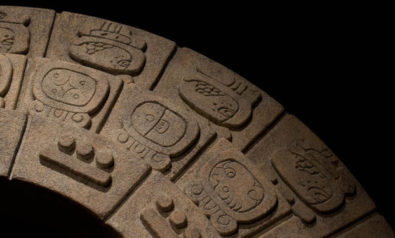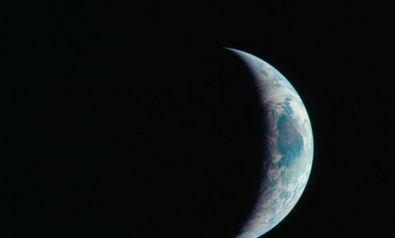A lighthearted approach to the “2012 end of the world prophecy” through a small appraisal of Douglas Adams’s “The Hitchhiker’s Guide to the Galaxy”.
The subject of huge discussion – or like every Douglas Adams’s fan would recognize, a topic even more outrageous than the amount of times someone can actually say the word “Belgium” – has been why December 2012 is, was, or will be, appointed as the end of the world. Let us consider an improbable, yet not so mind-boggling possibility: two friends plan to meet for a ball game. One of them, a truly dedicated hard worker, is working overtime and already late. This makes the other one very upset, who, being the inveterate bon vivant that he is, decide to go pick him up. “What a workaholic” he mumbles, “someone needs to teach him how to have fun!” When he arrives, he demands: “Let’s go, we’re late – I’ve only reserved the ball court for an hour.” The devoted worker murmurs in agreement, stops what he’s doing and off they go. While walking along the street, the two friends encounter a much hazardous fate and both are bitten by a poisonous snake. They die. The hard working one was a calendar writer in the city of Palenque. He had left the calendar he was working on unfinished – it stopped on 21st December 2012. Before his boss could order the continuation of the calendar, a massive, raging storm fell upon the city and destroyed many of its buildings. Everything had to be rebuilt and in the midst of the tragedy someone forgot to continue the calendar. Could this be the case? Could this be the answer as to why the Maya ended their calendar on 21st December 2012? Who knows? And more importantly, did anyone say the word “Belgium”? I invite you to look at the 2012 phenomenon from a “sketchier side of life”, namely, the one that can be found in the work of the great and much missed Douglas Adams.
Indeed, the “2012 Apocalympics”, as Gia Milinovich so aptly calls the current hysteria, presents a wonderful opportunity to be reminded of this delightful piece of literature. "The Hitchhiker’s Guide to the Galaxy" is one of the funniest, if not the funniest science fiction novel ever written. It started as a radio comedy broadcast on BBC Radio and then it became, among several other things, a “trilogy” of five books published between 1979 and 1992. In 2005 the long awaited film version was released.
The radio series was a compilation of episodes which all ended with the Earth being destroyed in a different way. But if you’re going to travel around the universe after your home planet is destroyed, you’ll certainly need a travel guide – a guide to the galaxy. The idea came to the young Adams in 1971, when he was hitchhiking through Europe. One day, lying drunk in a field in Innsbruck, holding the “Hitch-hiker’s Guide to Europe” while staring at the stars, Adams thought how good it would be if someone would also write a guide to the galaxy.
The plot of the book, in spite of the different adaptations, changes and editions, revolves around two earthlings, their alien friends and the adventure they undertake through the universe. “The Hitchhiker’s Guide to the Galaxy” – which has the words “DON’T PANIC” on its cover – renders explanations and advice during their travelling. One of the aliens is living among us on Earth and is responsible for writing the entry about Earth on this electronic guidebook. The book is published by Megadodo Publications, one of the great galactic publishing houses of Ursa Minor Beta, a planet which has a city where it is always Saturday afternoon. One discovers later that the entry that he wrote about the Earth consists of just two words: “mostly harmless”. A few minutes before the Earth is destroyed, because the interplanetary government wants to build a hyper-spatial express route which will pass through exactly where the Earth is, this alien reveals himself as such to a friend – the unlucky Arthur Dent – and they catch a ride around the universe. The only thing they need with them is a good towel. According to Ford Prefect – the somewhat awkward, eccentric alien from a small planet somewhere in the vicinity of Betelgeuse – towels are the essential apparatus for hitchhikers. The claim is of course supported by the guide itself which delivers a curious explanation about it. The adventure takes the characters to bizarre yet familiar places: “Milliways”, also known as “the restaurant at the end of the universe”, where every night there is a show simulating the end of the universe because the restaurant is de facto at the “end” of the universe – a kind of last New Year’s Eve, where your meal is your last, but not really. The only way to get there is by time travel. The sole character that gets there without time travel is Marvin, a maniac depressed robot, and only because he is very patient. Or the “Bing Bang Burger Bar”, which is “located” on the opposite side of “Milliways”; a wooden shack where the man who actually rules the whole universe lives peacefully with his cat and Magrathea – a planet where the planet making industry once ruled the universe – and where a mysterious man who claims he was responsible for making the fjords in Norway enlightens the characters about some of the puzzling questions the universe seems to offer. This character is wonderfully portrayed by Bill Nighy in the film version.
Notably influenced by authors like Wodehouse, and to a certain extent by Vonnegut, Adams very much brought a Monty Python feeling to what you could hardly label as pure science fiction. In fact, the “Hitchhiker’s Guide” will bring you to a world where cricket, towels, whales ruminating on the meaning of their life while falling from the sky, and the “Babel Fish” (an in-ear instant translation device which allows you to understand all the languages in the universe) co-exist as if this is entirely normal. We are taken on a wonderful, witty and intelligent journey through the ultimate questions about life, the universe and everything. The answer will always be “forty-two” though. And if that is not enough for you, a race of hyper-intelligent-pan-dimensional beings has come up with a question, which they think would better suit such an answer and will be very profitable for television shows: “how many roads must a man walk down?”
The legacy that Adams has left us is truly portentous – “One of the great wits of our age”, as his friend Richard Dawkins called him. Beyond the remarkable works of literature that he gave us, as well as the work with “Monty Python” and the “Dr. Who” television series, he was also a determined environmentalist and animal rights campaigner. Adams even climbed a “bit” of Kilimanjaro in a rhino suit to raise money to fight the trade in rhino horn.
After his death in 2001, fans all over the world started to celebrate “towel day” on 25th May, where all the fans carry a towel around with them for the whole day. On 11th March 2012, Douglas Adams would have celebrated his 60th birthday. His family, friends and the "Save the Rhino" charity association held a birthday celebration in his honour at the Hammersmith Apollo in London. The celebration included many of his friends such as Terry Jones, Stephen Fry, John Lloyd and even a band led by Pink Floyd’s David Gilmour.
What would Adams say about the 2012 end of the world prophecy? Certainly he would present us with an intelligent and witty remark about it. Nevertheless, there is one thing we can somehow be sure of: if 2012 is indeed the last edition of planet Earth – although it isn’t certain and probably far from being true – then “don’t panic” and buy a good, nice towel. Moreover, what may be “misinterpreted as a surprisingly sophisticated attempt to do a double-backward somersault through a hoop while whistling the “Star-Spangled Banner” by a dolphin could actually be a message: “so long and thanks for all the fish”.
The views expressed in this article are the author's own and do not necessarily reflect Fair Observer’s editorial policy.
Support Fair Observer
We rely on your support for our independence, diversity and quality.
For more than 10 years, Fair Observer has been free, fair and independent. No billionaire owns us, no advertisers control us. We are a reader-supported nonprofit. Unlike many other publications, we keep our content free for readers regardless of where they live or whether they can afford to pay. We have no paywalls and no ads.
In the post-truth era of fake news, echo chambers and filter bubbles, we publish a plurality of perspectives from around the world. Anyone can publish with us, but everyone goes through a rigorous editorial process. So, you get fact-checked, well-reasoned content instead of noise.
We publish 2,500+ voices from 90+ countries. We also conduct education and training programs
on subjects ranging from digital media and journalism to writing and critical thinking. This
doesn’t come cheap. Servers, editors, trainers and web developers cost
money.
Please consider supporting us on a regular basis as a recurring donor or a
sustaining member.
Will you support FO’s journalism?
We rely on your support for our independence, diversity and quality.








Comment